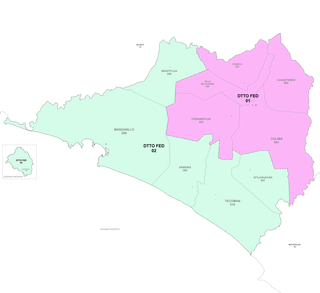Related Research Articles

The third federal electoral district of Aguascalientes is one of the 300 electoral districts into which Mexico is divided for elections to the federal Chamber of Deputies and one of three such districts in the state of Aguascalientes.

The first federal electoral district of Baja California Sur is one of the 300 electoral districts into which Mexico is divided for elections to the federal Chamber of Deputies and one of two such districts in the state of Baja California Sur.

The second federal electoral district of Chihuahua is one of the 300 electoral districts into which Mexico is divided for elections to the federal Chamber of Deputies and one of nine such districts currently operating in the state of Chihuahua.

The fourth federal electoral district of Chihuahua is one of the 300 electoral districts into which Mexico is divided for elections to the federal Chamber of Deputies and one of nine such districts currently operating in the state of Chihuahua.

The fourth federal electoral district of Yucatán(Distrito electoral federal 04 de Yucatán) is one of the 300 electoral districts into which Mexico is divided for elections to the federal Chamber of Deputies and one of six such districts in the state of Yucatán.

The second federal electoral district of Coahuila is one of the 300 electoral districts into which Mexico is divided for elections to the federal Chamber of Deputies and one of eight such districts in the state of Coahuila.

The fourth federal electoral district of Coahuila is one of the 300 electoral districts into which Mexico is divided for elections to the federal Chamber of Deputies and one of eight such districts in Coahuila.

The sixth federal electoral district of Chiapas is one of the 300 electoral districts into which Mexico is divided for elections to the federal Chamber of Deputies and one of 13 such districts in the state of Chiapas.

The first federal electoral district of Colima is one of the 300 electoral districts into which Mexico is divided for elections to the federal Chamber of Deputies and one of two such districts in the state of Colima.

The third federal electoral district of Mexico City is one of the 300 electoral districts into which Mexico is divided for elections to the federal Chamber of Deputies and one of the 22 currently operational districts in Mexico City.

The twelfth federal electoral district of Mexico City is one of the 300 electoral districts into which Mexico is divided for elections to the federal Chamber of Deputies and one of the 22 currently operational districts in Mexico City.

The eighteenth federal electoral district of Mexico City is one of the 300 electoral districts into which Mexico is divided for elections to the federal Chamber of Deputies and one of the 22 currently operational districts in Mexico City.

Martha Palafox Gutiérrez was a Mexican politician affiliated with the Labor Party.

The twentieth federal electoral district of Mexico City is one of the 300 electoral districts into which Mexico is divided for elections to the federal Chamber of Deputies and one of the 22 currently operational districts in Mexico City.

The seventh federal electoral district of Hidalgo is one of the 300 electoral districts into which Mexico is divided for elections to the federal Chamber of Deputies and one of the seven currently operational districts in the state of Hidalgo.

The second federal electoral district of Morelos is one of the 300 electoral districts into which Mexico is divided for elections to the federal Chamber of Deputies and one of five such districts in the state of Morelos.

The fourth federal electoral district of Morelos is one of the 300 electoral districts into which Mexico is divided for elections to the federal Chamber of Deputies and one of five such districts in the state of Morelos.

The fourth federal electoral district of Veracruz is one of the 300 electoral districts into which Mexico is divided for elections to the federal Chamber of Deputies and one of 19 such districts in the state of Veracruz.

The seventh federal electoral district of Veracruz is one of the 300 electoral districts into which Mexico is divided for elections to the federal Chamber of Deputies and one of 19 such districts in the state of Veracruz.

The eighth federal electoral district of Veracruz is one of the 300 electoral districts into which Mexico is divided for elections to the federal Chamber of Deputies and one of 19 such districts in the state of Veracruz.
References
- ↑ "Perfil: Dip. Ana Georgina Zapata Lucero, LXI Legislatura". Sistema de Información Legislativa (SIL). SEGOB . Retrieved 12 December 2014.
- ↑ "Perfil: Dip. Ana Georgina Zapata Lucero, LXIII Legislatura". Sistema de Información Legislativa (SIL). SEGOB . Retrieved 22 August 2024.